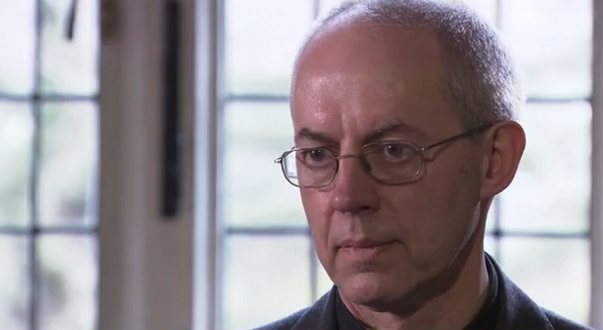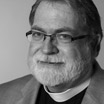Like many of you, I try to keep up on things going on in the Anglican world. There has been so much commentary on the upcoming gathering of the Archbishops and Primates of the Anglican Communion in January, 2016 – I wasn’t sure I had anything else to say beyond what I wrote several weeks ago until a friend wrote me yesterday. He had just read the sermon the Archbishop of Canterbury, Justin Welby, had preached at the consecration of the new chapel at Virginia Theological Seminary (VTS). My friend wrote me, “I’m appalled. He [++Canterbury] speaks of the sin of Anglican and Christian disunity and specifically exempts the Episcopal Church (TEC) from responsibility for those divisions.” So I thought I had better take a closer look at the sermon, the transcript of which you can find here on the VTS website.
As I read the sermon, I found a number of quotes that would encourage biblically faithful Anglicans. “In death and resurrection we are drawn back into the presence of the living God who raised Jesus Christ from the dead,” he preached, as he wondered at the rise of this new chapel out of the ashes of the old. He spoke of the universal condition of sin that all people, all “pilgrims” have and will bring into this new place of worship, “every sorrow and worry that exists in the human heart, and every sin and failure that would horrify us if we knew them and if they were painted on the walls of this building….Yet we are drawn together: together we discover the depths of our sin, together we recognise that we are the cause of Christ’s death on the cross, just as we also together glimpse the heights of his love.”
And as he drew to a close, pondering the purpose for which this new chapel has been built, he framed that purpose within the last words of Jesus’ own greatest sermon (Matthew 7:24-27). He said “We must build our house on a rock. Not any rock of our own choosing, but the rock that He sets us, the rock of obedience to His word.”
This is the heart of the transforming Gospel that we affirm as biblically faithful Anglicans following Jesus Christ: sin as the fundamental condition of humanity, the death of Jesus Christ on the cross for our sins as the solution for this wretchedness, his resurrection from the dead, and our obedience to the Scriptures as the rock on which we stand in every storm or fire. Amen!
But in the very same message, he rightly singles out the divisions within the church:
“My heart breaks when I think of our divisions. How they offend Christ. I’m not talking about you – I’m talking about myself, about the Anglicans, the Christians around the world….” (emphasis added).
Say again? Archbishop, you are preaching at a seminary of TEC, to former Presiding Bishop Frank Griswold who consecrated Gene Robinson over against the pleas of fellow Anglican Primates not to do so, who warned him that such action would tear the fabric of the Communion at its deepest level, and resulted in the very divisions you are calling out today. “I’m not talking about you…” Really?
Well, what about the retiring Presiding Bishop of TEC who has deposed more clergy in her tenure than any other Bishop in the history of any Church in the Anglican Communion, who has spent millions of dollars suing individual lay people of departing churches, and who is sitting right there in the chapel before you? We are reminded of your words extolling her “remarkable gifts of intellect and compassion” when she was awarded her honorary degree from Oxford. I guess you couldn’t possibly be talking about her – and so you said, “I’m not talking about you.”
Well, what about the incoming Presiding Bishop Michael Curry, who gave outspoken support for rites for the blessing of same sex unions in an interview. Curry said, “I believe we are doing the loving thing, we are doing what Jesus would call on us to do. We are finding a way to support and care for people who have shown lifelong care and love for each other.” This is a flat contradiction of Anglican Communion teaching prohibiting the blessing of same-sex unions – teaching recognized and upheld by the vast majority of Anglicans worldwide (Lambeth Resolution 1.10, 1998). Was it not divisive, and did it not break the heart of Jesus – what Curry said and did – simply because he used Jesus’ name while ignoring Jesus’ words about marriage between a man and a woman? (Matthew 19:4-6). And so you said to him as well, “I’m not talking about you.”
Was the Archbishop trying to be polite in mixed company? Was he quietly drawing a fine distinction in his mind between “marriage” and “rites for the blessing of same sex unions”? Did he suddenly forget the whole text of Lambeth Resolution 1.10? Was he reading a line from his sermon notes inserted by an errant staffer – a line he hadn’t the time to correct? Or did he simply ignore the complaints he has received, privately and publicly, from Primates of GAFCON and the Global South who have steadfastly protested and grieved the unilateral revisions of doctrine and discipline that TEC and the Anglican Church of Canada have effected since the 2003 election and consecration of a partnered gay bishop in TEC, and first rites for the blessing of same sex unions in Canada (New Westminster)?
How do we square Archbishop Welby’s personal, specific exemption of The Episcopal Church leaders, teachers and students he was addressing at VTS with his declaration of obedience to the word of God as the rock on which we must build?
We can’t. His comments raise more questions than they answer.
What then can we hope for from his facilitation of the meeting he has called in January? Can we rely on him to cooperate in any discipline of TEC and Canada that the Primates of GAFCON and the Global South have long requested? Are his hands tied by the internal fractures within the Church of England over these very same issues? And if his hands are tied, is there reason to hope that the Archbishop of Canterbury can reconstitute a divided Communion – divided on faith and order, doctrine and discipline – around himself? Does it make any sense to continue to define membership in the Anglican Communion as “communion with the See of Canterbury” when that See is hostage to internal politics beyond his control? Should the leadership of an Anglican Communion any longer be driven by the internal politics of one nation, even if it is England?
Is his sermon a preview of what is to come – using Gospel proclamation and Biblical language to try and hold together fundamentally irreconcilable theologies about God, Jesus, sin, salvation, discipleship and other essentials of the Christian faith? Is his sermon a preview of something we have seen before on this side of the pond – appealing with Gospel language and proclamation on the one hand, while on the other allowing leaders and churches to establish facts on the ground that are contrary to the obedience to Christ and his word that the Archbishop continues to proclaim?
What hope is there in that?
It is good to hope for a positive outcome from the Primates gathering in January. But it is even better to pray. Hope is good. Prayer is essential.
This is a time to pray for extraordinary courage on the part of all the Archbishops and Primates of the Anglican Communion who will be at Canterbury in January – to pray that they will do the right thing together. To pray that they will honor both truth and love by doing what Jesus would do, and saying what he would say. To pray that they will have the mind of Christ (Phil. 2:5-11) in the mind of the Church, and that they may finally take order of the Church.
But above all it is a time for us to set our hope in the right place, as the Psalmist reminds us:
“Find rest. O my soul, in God alone: my hope comes from him. He alone is my rock and my salvation; he is my fortress, I will not be shaken. My salvation and my honor depend on God; he is my mighty rock, my refuge. Trust in him at all times, O people: pour out your hearts to him, for God is our refuge.” (Psalm 62:5-8)
Selah
The Rev. Canon Phil Ashey is CEO of the American Anglican Council.



